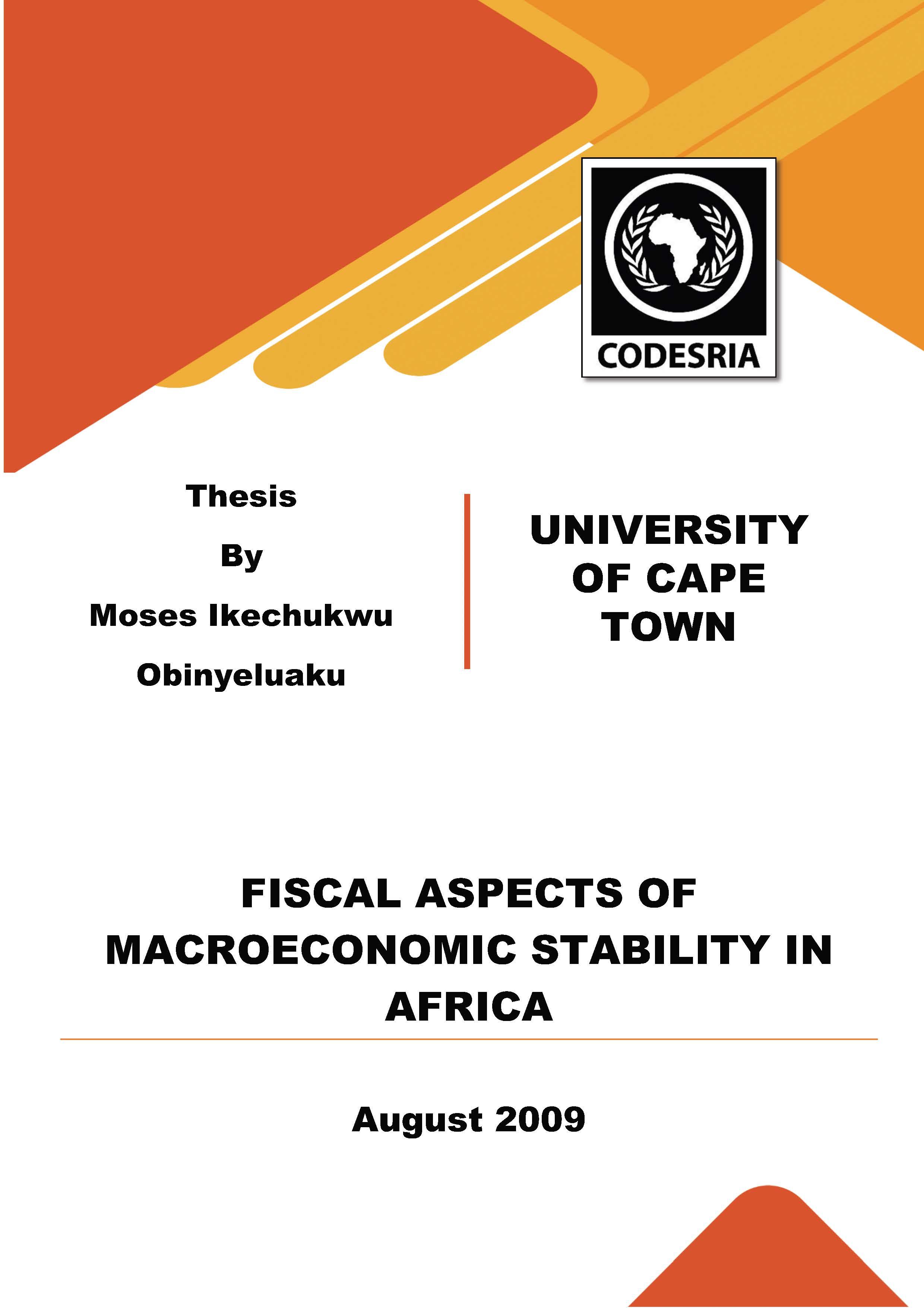FISCAL ASPECTS OF MACROECONOMIC STABILITY IN AFRICA
Mots-clés :
FISCAL, MACROECONOMIC, AFRICASynopsis
This study analyses empirically the nature of fiscal and monetary policy interdependence and fiscal dynamics in Africa. It also looks at the possibility of implementing viable fiscal policy rules and institutions that are consistent with economic and monetary stability and growth.
The study starts off by looking at the way economists have framed the analysis of fiscal and monetary policy interdependence. While conventional theory holds that inflation is a monetary phenomenon, recently the Fiscal Theory of Price Determination (FTPD) has instead argued that inflation can be a fiscal phenomenon. We argue that the latter is an encompassing description of the relation between fiscal policy and monetary policy in Africa and it forms the basis of our empirical analysis.
Hence, we test the FTPD in Africa using recursive vector autoregressive (VAR) model for 20 African countries. The results show that fiscal policy is dominating monetary policy in many countries in the sample. It also points out that a fiscal dominance regime may arise regardless of monetary policy independence. This implies that fiscal policy matters for achieving and maintaining price stability in Africa.
Next, we extend the analysis using panel data techniques on a set of 43 African countries to assess the robustness of the preceding results, and at the same time to evaluate the stabilising or destabilising characteristics of fiscal policy in Africa. The results support the existence of a fiscal dominant regime on the continent. This response however seems to be weaker in the sub-sample period, suggesting that there has been an effort by the fiscal authorities to improve on fiscal outcomes in recent times, although a regime shift has not yet occurred. Additionally, evidence seems to support a procyclical fiscal policy or fiscal
destabilization in Africa.
Further, we use panel Granger causality tests to examine the direction of causality between government revenue and expenditure. Specifically, this aims at detecting symptoms of fiscal instability deriving from the dynamic interaction of fiscal revenues and expenditures. The results support a unidirectional causality from revenue to spending in the full sample period, and no causality in the recent period (in line with the Panel evidence). Government expenditure follows revenue, suggesting a pro-cyclical expenditure policy to changes in government revenue. Hence, African countries could enhance the effectiveness of fiscal policy by making budget expenditure less driven by revenue availability.
Finally, we use Monte Carlo simulation techniques to evaluate how the introduction of fiscal rules might affect the risk of unsustainable debt accumulation in an environment where fiscal revenues are highly uncertain, a typical characteristic of fiscal processes in Africa. Contrary to the prevailing literature, the results suggest that introducing some element of flexibility in the way fiscal expenditure is planned, with the use of flexible policy rules, might, under realistic circumstances, increase the risk of unsustainable debt accumulation because it magnifies the effect of unexpected revenues’ reversal.
Téléchargements
Références
Ablo, E and R. Reinikka (1998) “Do Budgets Really Matter: Evidence from Public Spending on Education and Health in Uganda”, World Bank Policy Research Working Papers 1926
Afonso, Antonio (2008) “Ricardian Fiscal Regimes in the European Union”, Emperica, 35: 313-334 (2002), “Disturbing the Fiscal Theory of The Price Level: Can it Fit the EU-15?” Department of Economics, Institutio Superior de Economia e Gestao, Universidade Tecnicca de Lisboa
Afonso, Antonio and Christophe Rault (2009) “Bootstrap Panel-Granger Causality between Government Budget and External Deficits for the EU, Working Paper School of Economics and Management Lisbon
Aguiar, M, M.Amador and G.Gopinath (2005) “Efficient Fiscal Policy and Amplification”, University of Chicago and NBER (June)
Alesina, A and R. Perotti (1999) “Budget Deficits and Budget Institutions”, in J. Poterba and J. von Hagen, eds.: Fiscal Institutions and Fiscal Performance”, pp 13-36, NBER and University of Chicago Press, Cambridge, MA
Alt, J.K and D.D Lassen (2006) “Transparency, Political Polarization and Political Budget Cycles in OECD Countries”, American Journal of Political Science, 50 (3): 530-550
Al-Qudair, Khalid H.A (2003) “The Relationship between Government Expenditure and Revenues in the Kingdom of Saudi Arabia: Testing for Cointegration and Causality”, Working Paper Department of Economics King Saudi University
Anderson, T.W. and C. Hsiao (1981) “Estimation of Dynamic Models with Error Components”, Journal of the American Statistical Association 76, 598-606 (1982) “Formulation and Estimation of Dynamic Models Using Panel Data”, Journal of Econometrics, Vol. 18
Antioch, Gerard (1998) “Fiscal Policy Dynamics in Australia and New Zealand”, Applied Economics Letters, 5 (September): 539-541
Arellano, M (1989) “A Note on the Anderson-Hsiao Estimator for Panel Data”, Economic Letters, 31: 337-341






